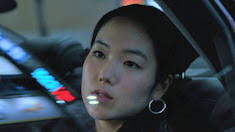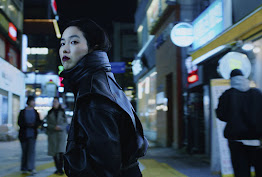Freddie’s given answer to this question relies on desperation and happenstance. She just felt the need to get away, she tells her mother in a very belated phone call, so she booked a flight to Japan (where she had been once with her family). When that flight got cancelled, the next available flight out was to Seoul, so she took it. Here’s the more likely explanation: she is ethnically Korean, adopted from Korea as an infant by a non-Asian French couple and, as we may imagine (since she doesn’t explain it this way), she has always felt somewhat the outsider in France as a trans-national adoptee.
Freddie’s face is enigmatic as well, in the sense that it is hard to read. Much of the time she appears dispassionate, betraying little to nothing about what she may be thinking or feeling. Even when she smiles, it’s hard to know what to infer - whether she is amused, scornful, about to do something brazenly unpredictable, or simply happy (although likely not). In short, she’s hard to get to know very well, and – a tribute to first-time actress Park Ji-min - all the more compelling for that. And that’s a good thing, because Freddie is in pretty much every frame of Return to Seoul.This is the third narrative feature film by writer/director Davy Chou. Chou is French but his heritage is Cambodian. In fact, his grandfather was an eminent filmmaker in 1960s Cambodia, who disappeared in 1969 during the Cambodian civil war. Chou was not an adoptee, he was born in France to Cambodian parents, but like Freddie, while he felt thoroughly French culturally, in his early twenties he began to feel some level of displacement. He described that feeling in an interview with Filmmaker magazine a few weeks ago.
“I decided to go to Cambodia for the first time in my life when I was 25, with a similar kind of free spirit that I would say is naive. I felt solid in my identity. … [I began] to understand that this feeling of self-assurance was a construction. Not that I was not French, but things are maybe more complex than that and evolving in your mind and sense of self. … I made the film out of an intuition, like Freddie actually. If you are reflecting too much, you will not move. Sometimes you need to move, and later on understand the meaning of that move.”
Freddie may not initially be clear on this, but she is on a quest to find herself, which is to say wanting to square her culturally French self with her Korean heritage and ethnicity. She only realizes that this may entail trying to link up with her birth parents after a day or two in Korea, when someone asks her if that’s why she has come. Before long, we find her at the adoption agency making inquiries.Return to Seoul is not your typical sentimental, heartwarming adoption movie, where the character has a cathartic experience realizing that the parents who raised her (or him) are the ones that matter or that both sets of parents are important to her and let’s all get along, happily ever after. [see e.g. Lion (2016)]. The film covers eight years of Freddie’s life, through a number of seemingly random moments and scenes as well as several abrupt jumps in time which, taken as a whole, paint a fuzzy, discontinuous [but, thankfully, chronological] portrait of Freddie’s personal evolution from a bright but aimless 25-year-old to a more centered, accomplished woman in her early thirties.
While the issue of identity/displacement is a major part of the narrative, Return to Seoul is not just that. It’s a component of what is more generally a coming-of-age story – a path that for many of us is or was fraught with miscues, mistakes, improvisation and experimentation. So it is with Freddie. The film is structured into four sections each corresponding with a birthday, with the first one - dealing with Freddie’s initial two-week Korean trip - the longest segment by far. The next part is two years later, the next five years after that, and the fourth and final section, one year later.At the outset, Freddie acts tough and confident, but she’s full of contradictions. She is self-centered, expecting the world to conform to her rather than the other way round, and easily becomes irritated when it does not. She is strikingly independent, whether the situation calls for that or not. She is sexually open but has no desire to be tied to a deep relationship with anyone. This includes not just sexual partners but literally anyone – including her biological father, whom she will eventually meet, a needy guy who wants more from Freddie than she is prepared to give. Over the course of the film, with an accumulation of experience, she evolves into the still searching but much more mature person we meet at the end. Her evolving character is fascinating to watch. In fact, the film as a whole is a brilliant construction, and it mostly works.
 Because we are dropped into various scenes and situations in Freddie’s life without much, if any, narrative preparation, Return to Seoul also presents a bit of a challenge. It leaves a lot of blanks and makes us work to stay with it at times and to see the whole at the end as the sum of its parts. Some parts, the lengthy first one in particular, are especially uneven – sometimes absorbing, carrying us along with an interesting or revealing conversation or a sudden confrontation, other times rather slow, and more observational than eventful. Some moments, for example, when Freddie visits with her bio-dad and his family owe a lot to the slow, impressionistic style of the great Japanese director Yasujirō Ozu (whom Chou admires). Scenes in dark, noisy music nightclubs are something else altogether.
Because we are dropped into various scenes and situations in Freddie’s life without much, if any, narrative preparation, Return to Seoul also presents a bit of a challenge. It leaves a lot of blanks and makes us work to stay with it at times and to see the whole at the end as the sum of its parts. Some parts, the lengthy first one in particular, are especially uneven – sometimes absorbing, carrying us along with an interesting or revealing conversation or a sudden confrontation, other times rather slow, and more observational than eventful. Some moments, for example, when Freddie visits with her bio-dad and his family owe a lot to the slow, impressionistic style of the great Japanese director Yasujirō Ozu (whom Chou admires). Scenes in dark, noisy music nightclubs are something else altogether. We are in such a club near the end of the first part when we get a couple of surprisingly clear clues about Freddie’s state of mind at that point. She asks the dj to play an upbeat, danceable song called Anybody (specifically written for the film), and dances alone to the music with increasing abandon. The lyrics emphasize two different lines: “I never needed anybody, anybody” and “You can’t make it alone.” [It’s actually a pretty catchy tune: listen here on Spotify or here on YouTube.] Moments later, after Freddie has abruptly put down a guy she had earlier slept with, her best friend tells her “You’re a really sad person.”
Chou really loves Park Ji-min’s face (understandably) and gives us many, many extreme close-ups – sometimes revealing of Freddie’s reaction to what is happening or what has happened, but often not so much. (Here I should note that Park Ji-Min is an artist (ceramicist) and that Return to Seoul is her first foray into acting – an auspicious debut.) Other camera shots sometimes linger far too long on an undeserving scene or moment. For example, on a trip to her biodad’s fishing village, there’s an overlong shot of Freddie looking out the car window expressionless – for what seems like minutes – perhaps to suggest that the trip is long and boring for her, perhaps not – but it is sure boring for us. These are quibbles, I suppose, but also examples of what I have labeled unevenness.After my first viewing of Return to Seoul, I was not sure what I thought about it. Other reviewers really adored this film – it has a strong Metascore critical rating of 87 and a Rotten Tomatoes critics’ rating of a whopping 97% - but my reaction was somewhere between confused and admiring. I did think it was a worthwhile film, but I also felt annoyed at having to work so hard to make sense of what I was seeing while the film was running. I was able to go back and watch most of it a second time, and, freed of the questions about where the narrative was going, I liked it better. I liked it a lot, in fact.
I liked the insightfulness that the director and the lead actress brought to the issues faced by some adoptees, particularly those of different ethnicities or cultural heritage than their adoptive parents. I liked Chou’s avoidance of a saccharine or clichéd treatment of the adopted person’s identity struggles and acceptance – the recognition that it’s a complicated process not a neat or simple one. And I loved the fact that the coming-of-age process for Freddie was anything but smooth – rather; indeed, it was frequently messy, sometimes even dangerous, and quite realistically an unfinished work in progress at the end of the picture.1 hour 55 minutes Rated R – for brief drug use, nudity and language
Grade: B+/A-
In limited theatrical release as of 3/6/2023, rolling out to more theaters over the next three to four weeks. Check HERE for a theater near you.






I thought this movie was boring and that it failed to offer a narrative that was visually or emotionally interesting. Maybe the director admired Ozu but he totally lacks the chops. Long, boring takes, confusing scenes, basically dull.
ReplyDelete